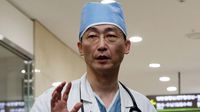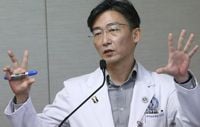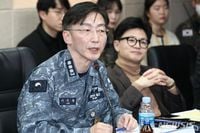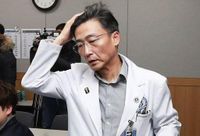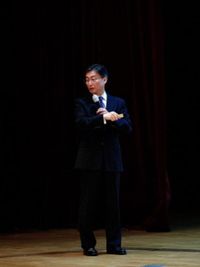On April 14, 2025, a lecture by Professor Lee Guk-jong for military officers in training at Goesan, North Chungcheong Province, sparked controversy as he delivered a scathing critique of the Korean medical system. The lecture, which has since gone viral on various online platforms, featured Professor Lee expressing his frustrations about the state of healthcare in South Korea, particularly regarding the treatment of younger doctors and the overall direction of the medical community.
Professor Lee began his remarks with a candid admission, stating, "Coming here was a mistake. There's nothing I can do for the younger doctors." He explained that he had been persuaded to give the lecture by the principal of Ajou University, who had personally approached him, and he accepted due to his position as a salaried employee of the Ministry of National Defense.
Throughout the lecture, Professor Lee did not hold back in his criticism, asserting that "Korea is a nation where only those with superficial knowledge thrive" and that this mentality has been ingrained in the culture for centuries. He claimed, "This is the DNA of Korea that has been passed down for thousands of years, and it will not change," suggesting a deep-rooted issue within the society that affects the medical field as well.
In a particularly alarming statement, he warned potential medical students against pursuing essential medical fields, saying, "If you want to live a miserable life, don't go to vital departments," referring to critical areas like emergency medicine and trauma surgery. He lamented, "I worked to death in trauma surgery for a lifetime, and there was nothing in return. My life is ruined. Professor Yoon Han-deok, who worked with me in trauma surgery, died of overwork. Don't end up like that." This reference to his late colleague highlighted the severe pressures faced by medical professionals in high-stress environments.
Professor Lee's comments extended to the ongoing conflicts within the medical community, where he stated, "Professors are middlemen who take advantage of others," criticizing the exploitation of younger doctors and the focus on cosmetic enhancements in hospitals rather than essential medical care. He remarked, "It's unacceptable for the public to see hospitals focusing on exterior improvements rather than essential medical care," pointing out that the priorities of large medical institutions often neglect the core mission of healthcare.
He also made a bold claim regarding patient care, asserting, "Even with just a shack or a tent, patients will come to Seoul National University Hospital or Severance Hospital for treatment." This statement underscored his belief that branding and perception often outweigh the actual quality of care provided.
Reactions to Professor Lee's lecture have been mixed but largely sympathetic among netizens. Many expressed understanding and empathy towards his frustrations, with comments like, "Even after decades of hard work, things don't get better. It's a state of self-abandonment," and others reflecting on the deep-seated feelings he shared about his career and the medical profession.
In the wake of his remarks, there has been an outcry regarding the conditions faced by medical professionals in South Korea. Following the government's announcement to increase medical school admissions by 2000 students, there has been a notable decline in the number of students pursuing vital specialties, further complicating the supply of medical professionals in critical areas.
Professor Lee's candid remarks have reignited discussions about the structural problems within the Korean medical community, including the pressures of overwork and the lack of support for younger doctors. His assertion that "If you're going to fail, leave Korea" resonated with many who feel disillusioned by the current state of the healthcare system.
In a society where the contributions of medical professionals are often overlooked, Professor Lee's comments serve as a stark reminder of the challenges faced by those on the front lines of healthcare. As a leading authority in severe trauma care, his experiences and insights carry significant weight, and his willingness to speak out may pave the way for much-needed reforms in the medical community.
As the conversation around healthcare continues, it remains to be seen how these revelations will influence the future of medical training and practice in South Korea. The need for systemic change is clear, and the voices of those like Professor Lee will be crucial in advocating for a better environment for both patients and healthcare providers alike.
